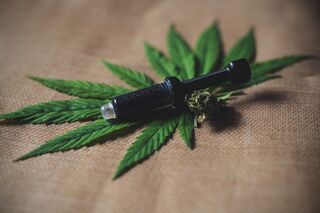Depression
Can Cannabis Help With Depression?
Maybe. But the current evidence wouldn’t recommend it.
Posted December 4, 2020 Reviewed by Devon Frye
The relationship between cannabis and mental health is complicated. I’ve written about it here. What follows is the transcript of an interview exchange with a reporter who was interested in understanding the relationship between cannabis and depression in a bit more depth.

Reporter: For cannabis consumers who have depression, what is the most important thing they should keep in mind?
Dr. Stea: If a person thinks that they are experiencing depression, then it is most important to reach out for help by seeking a referral to a mental health professional for an assessment.
Depressive symptoms can arise for many reasons and it’s therefore important to get an accurate diagnosis to inform the treatment plan. Sometimes frequent cannabis use itself can induce depressive symptoms, and so it’s possible that a period of abstinence will be required to better assess a person’s mental health.
Reporter: What are the potential benefits and adverse effects of cannabis as it relates to depressive symptoms?
Dr. Stea: While cannabis users commonly report that they use cannabis to help manage symptoms of depression, there are no randomized controlled trials to date that have evaluated the cannabis plant or particular cannabinoids for the treatment of major depressive disorder. And for the data that we do have that addresses whether or not cannabis helps or hinders depression, the evidence is mixed, and tilted towards the idea that cannabis likely leads to the development or worsening of depressive symptoms.
Clinically, there is evidence that people with depression who continue to use cannabis throughout treatment make less improvement on their mental health symptoms than people with depression who do not use cannabis during treatment.
Reporter: What is the nature of the relationship between the endocannabinoid system and depression?
Dr. Stea: We know that the endocannabinoid system is involved in mood regulation. For example, there’s some evidence that CB1 receptor antagonism can produce depressive symptoms, and that CB1 agonism might increase serotonin-related neural activity. And so in this vein, there is theoretical reason to be optimistic about the potential to develop cannabinoid-based medicines for depression—but from an evidence-based practice perspective, we are not yet even close to having the data to support or recommend the use of cannabis for the treatment of depressive symptoms.
Reporter: What advice would you give to a consumer or patient for monitoring or tracking their mental well-being in relation to cannabis use and other medical treatment such as therapy and medication?
Dr. Stea: If a person is a regular cannabis user and experiencing depressive symptoms, then it is important to first seek help from a mental health professional. Depression is a serious condition and not to be taken lightly. Given the reinforcing properties of cannabis, it is no wonder that one population particularly at risk for developing cannabis addiction is those who experience mental disorders. Cannabis users with mental disorders are approximately twice as likely as cannabis users without mental disorders to have or develop cannabis addiction.
It’s also extremely important to know that therapy does not equal reinforcement. In other words, it is important not to conflate both the positive and negative reinforcing properties of cannabis with its therapeutic effect. We know that cannabis can be positively reinforcing insofar as it can exert effects on brain dopaminergic function and produce feelings of euphoria. And we know that cannabis can be negatively reinforcing, insofar as it can provide temporary relief of negative emotional states. When someone uses cannabis (or any substance for that matter) to achieve temporary symptomatic relief, that doesn’t necessarily mean that the use of the substance is therapeutic, especially if continued use exacerbates or maintains a mental disorder, rather than helping to resolve it. And in fact, it’s these very behavioural principles of classical and operant conditioning that play a role in the development of addiction.
A more clear-cut case of this idea is with benzodiazepines. They are unfortunately frequently given to people for short-term relief of anxiety symptoms; and yet, if they are used long-term to manage anxiety disorders, we know that it very often makes anxiety worse and leads to benzodiazepine physiological dependence—it can also lead to addiction.
Reporter: Beyond the mixed and inconclusive research results thus far, is there anything else regarding cannabis and depression that should be highlighted?
Dr. Stea: I want to highlight that cannabis is a complicated substance, and the research on cannabis is complicated, and so messaging should reflect this reality by being nuanced and gray. In this way, I really think that a humble and open-minded attitude is needed when talking about cannabis. I also want to drive home the message that neither positive nor negative reinforcement equates to therapy. Again, in other words, short term symptom relief of depression does not mean that a mental disorder is being treated or resolved, and in fact, it could make it worse because it can interfere with the learning of healthy adaptive coping strategies, such as tolerance and exposure to uncomfortable emotions.


